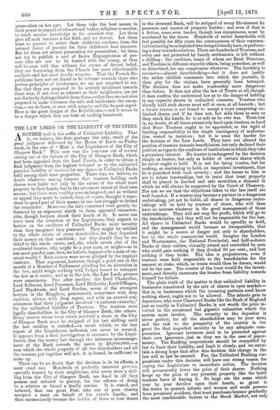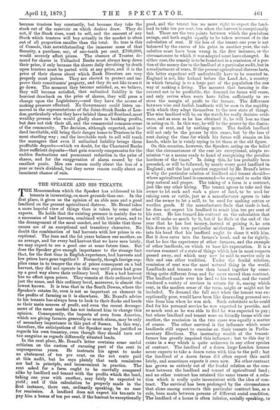THE LAW LORDS ON THE LIABILITY OF TRUSTEES. A NOTHER nail
in the coffin of Unlimited Liability. That is, we believe, the first, perhaps the only, result of the great judgment delivered by the House of Lords on Friday week, in the case of "Muir v. the Liquidators of the City of Glasgow Bank." This case was the test-case out of several arising out of the failure of the City of Glasgow Bank, which had been appealed from the local Courts, in order to obtain a final judgment from the highest tribunal as to the unlimited personal liability of trustees for any shares in Unlimited Banks held among their trust properties. There was, we believe, no doubt whatever among lawyers that trustees holding such -shares were liable not only to the extent of the whole trust property in their hands, but to the uttermost extent of their own -means ; but there were wealthy men endangered, and as without an appeal they must be ruined, they, of course, thought it expe- dient to spend part of their means in one last struggle to defend the remainder. Moreover, the laity concerned were greatly in- fluenced by an argument which to them appeared unanswer- able, though lawyers shook their heads at it. It never can have been the intention of the Legislature, they argued, to bestow on the creditors of Unlimited Banks more security than they imagined they possessed. They might be entitled to the whole estate of every shareholder, for they deposited their money on that condition ; but why should they be en- titled to the whole estate, and„ the whole estate also of the accidental trustee, who might be a poor man, or might—as in -one most painful case, does, we believe, happen—be a man of un- usual wealth ? Both estates were never pledged by the implicit -contract. That argument, however, though a good one in the month of a Member of Parliament pleading for an alteration in the law, could weigh nothing with Judges bound to interpret the law as it exists ; and as to the law, the Law Lords present were unanimous. One after another, the Lord Chancellor, Lord Selborne, Lord Penzance, Lord Hatherley, Lord O'Hagan, Lord Blackburn, and Lord Gordon, seven of the strongest lawyers in the Kingdom, pronounced, sometimes with deep emotion, always with deep regret, and with an avowed con- sciousness that their judgment involved "a national calamity," for the unlimited liability of Trustees. The trustees were legally shareholders in the City of Glasgow Bank, like others. Every trustee whose trust estate involved a share in the City -of Glasgow Bank must be stripped of his last shilling until the last creditor is satisfied,—a result which, as the last report of the Liquidators indicates, can never be secured. It appears from a final investigation of accounts by the Liqui- dators, that the money lost through the infamous mismanage- ment of the Bank exceeds the assets by L6,000,000,—a sum which the whole property of all the shareholders and all the trustees put together will not, it is feared, be sufficient to make up.
There can be no doubt that the decision is, in its effects, a most cruel one. Hundreds of perfectly innocent persons, specially trusted by their neighbours, who never drew a shil- ling from the City of Glasgow Bank, are fined in all they possess and reduced to penury, for the offence of doing to a relative or friend a kindly service. It is stated, and believed, that one great Peer, who out of pure charity accepted a trust on behalf of his tutor's family, and thus unconsciously became the holder of three or four shares in the deceased Bank, will be stripped of every life-interest he possesses and masses of property besides ; and even if that is a fiction, cases even harder, though less conspicuous, must be numbered by the dozen. Hundreds of entire households will feel possibly for fifty years the consequences of their represen- tatives having been beguiled into doing a friendly turn, or perform- ing a duty towards relatives. There are hundreds of Trustees, and every one not protected by family settlements is left without a shilling ; the creditors, many of whom are Bank Directors, and Trustees in different ways for others, being powerless, as well as disinclined, for any compromise whatever. The hardship is excessive—almost heartbreaking—but it does not justify the rather childish comments into which the journals, in their pity for the victims, have generally been betrayed. The decision does not make trusteeship more dangerous than before. It does not alter the law of Trusts at all, though it does confirm the understood law as to the danger of holding in any capacity shares in unlimited concerns. Trustees who already hold such shares must sell at once, at all hazards ; but a future trustee is not bound to accept a trust comprising un- limited shares, and if he does not, but sells them as soon as they reach his hands, he is as safe as he ever was. Trust-law is, no doubt, at all times excessively hard upon trustees, so hard that State Trustees ought to be appointed, or the right of limiting responsibility to the single contingency of malversa- don vested in testators ; but it is none the harder for the decision of the Law Lords. They have not altered the position of trustees towards beneficiaries, but only declared their position as regards the creditors of institutions in which they take a pecuniary interest. No trustee is endangered by the decision simply as trustee, but only as holder of certain shares which he never ought to hold. It is not for being trustee, but for making, or continuing to hold, an imprudent investment, that he is punished with such severity ; and the lesson to him is not to refuse trusteeships, but to insist that trust property shall be placed in limited and safe securities, a demand in which he will always be supported by the Court of Chancery. Nor can we see that the objections taken to the law itself are well founded. If a trustee may become a partner in a dangerous undertaking, yet not be liable, all shares in dangerous under- takings will be held by trustees of straw, who will then have no interest whatever in the good management of those undertakings. They will not reap the profit, which will go to the beneficiaries, and they will not be responsible for the loss. All shares in Unlimited Banks would be speedily so held, and the management would become so irresponsible, that it might be a source of danger not only to shareholders, but to the whole commercial world. Imagine the London and Westminster, the National Provincial, and half-a-dozen Banks of their calibre, virtually owned and controlled by men who could gain nothing if they divided 30 per cent., and lose nothing if they broke. The idea is preposterous, even if trustees were held responsible to the beneficiaries for the amount at stake, which, as trusts would then be drawn, would not be the case. The creator of the trust would fix the invest- ment, and directly exonerate the trustee from liability towards himself for failure.
The plain truth of the matter is that unlimited liability in businesses transferred by the sale of shares in open market— that is, in businesses which the incoming partners need know nothing about, ought not to be allowed. The minute gain to depositors, who trust Chartered Banks like the Bank of England just as readily as Unlimited Banks, is not worth the price in- volved in the occasional but gigantic calamities which the system must involve. The security to the depositor is never perfect, for all the shareholders may be poor men, and the risk to the prosperity of the country is too great for that imperfect security to be any adequate com- pensation. Ignorant investors need to be protected against their own ignorance, just as they are in the case of paper- money. The Banking corporations should be compelled by law to limit their liability, and limit it closely, and we enter- tain a strong hope that after this decision this change in the law will at last be secured. For, the Unlimited Banking cor- porations under this decision will have one strong reason for urging the Legislature to immediate action. The decision will permanently lower the price of their shares. Nothing keeps up- the price of any personal property like the habit trustees have of buying it. So large are the sums which year by year devolve upon their hands, so great is the desire to protect infants and women and weak persons from pecuniary accident, that trust purchases become gradually the most considerable factors in the Stock Market, not only because trustees buy constantly, but because they take the stock out of the reservoir on which dealers draw. They do not, if the Stock rises, want to sell, and the amount of any Stock which trustees will buy actually in the market is often out of all proportion smaller than the total. So true is this of Consols, that notwithstanding the immense mass of that Security, a purchase, say, of one-tenth per cent. £700,000, would severely affect prices. The absence of Trustee de- mand for shares in Unlimited Banks must always keep down their price, if only because the shares daily devolving by death upon trustees must be parted with at any price, and it is the price of their shares about which Bank Directors are very properly most jealous. They are elected to protect and im- prove their constituents' property, and they do not like to see it go down. The moment they become satisfied, as, we believe, they will become satisfied, that unlimited liability is the heaviest drawback on the price of shares, they will press a change upon the Legislature,—and they have the means of making pressure effectual. No Government could listen un- moved to the representations of the Joint-Stock Banks of Lon- don, particularly when they have behind them all Scotland, most wealthy persons who would gladly share in banking profits, but dare not risk their all, and the commercial common-sense of the community. The decision, although expected, and in- deed inevitable, will bring their danger home to Trustees in the most startling way ; and the inevitable rush to sell will teach the managers that even if unlimited liability brings them profitable deposits—which we doubt, for the Chartered Banks draw sufficient deposits—that gain scarcely compensates for the sudden fluctuations and permanent reduction in the price of shares, and for the exaggeration of alarm caused by the smallest panic. Men can reason coolly about the loss of a year or two's dividend, but they never reason coolly about an imminent chance of ruin.



































 Previous page
Previous page